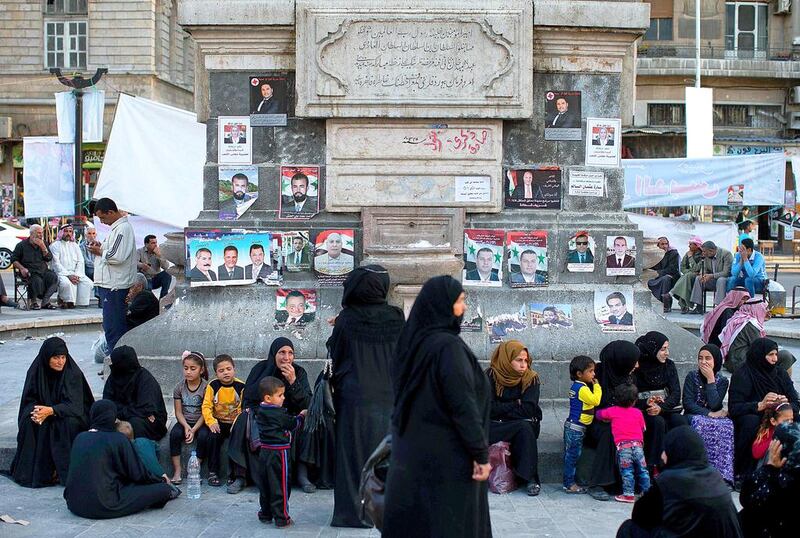BEIRUT // Peace talks between representatives of the Syrian government and opposition are set to restart in Geneva on Wednesday, but optimism for their success has been muted by a collapsing ceasefire and mixed signals on whether the warring parties are prepared to seriously negotiate.
Ten days of indirect negotiations were adjourned on March 24, but made little progress.
Hopefulness over the last round of talks was bolstered by a ceasefire agreement in place since February 27 that was still largely holding and had caused violence to plummet. But in the nearly three weeks since the last talks, that ceasefire has begun to tatter.
Al Qaeda affiliate Jabhat Al Nusra – which is explicitly excluded from the ceasefire and any Syria peace deal – has shown its continued ability to influence other rebel groups by leading recent offensives against regime forces south of Aleppo and in Latakia province. Al Nusra has been seen as trying to take advantage of the military reliance many groups have on it to play a spoiler role in any reconciliation in Syria.
Among rebel groups that appear to have largely disregarded the ceasefire are two of the most powerful: The hardline Salafi militias Jaish Al Islam and Ahrar Al Sham. Jaish Al Islam, whose leader Mohammed Alloush has been tapped as the opposition’s chief negotiator in Geneva, has repeatedly said that they do not regard the ceasefire as valid due to regime violations. Ahrar Al Sham, an ally of Al Nusra, has also continued its fights and bragged of its victories on social media.
Rebel groups say their attacks have been retaliatory in nature, but they have also gained ground by pushing offensives.
On Monday, UN Syria envoy Staffan de Mistura called the ceasefire “fragile”, saying: “We need to make sure that it continues to be sustained even when there are incidents to be contained.”
As negotiators head to Geneva, the regime may be planning a major offensive that could shatter what is left of the ceasefire. On Sunday, Syrian prime minister Wael Al Halqi said government forces were planning an operation to retake Aleppo, Syria’s most populous city before the war, with the help of Russian air strikes.
Russia’s ministry of defence on Monday denied it was planning an “assault” of Aleppo, saying it was instead focusing on targeting Al Nusra fighters near the city with the help of the Syrian government. Moscow said 8,000 Al Nusra militants south-west of Aleppo were preparing to mount a large-scale offensive to try to capture the government-controlled road linking Aleppo with Damascus and must be stopped.
But despite the slipping ceasefire and talks of a major government push on Aleppo, there have been signs from the regime that they could potentially be willing to negotiate.
Speaking to Russia’s state-run Tass news agency on Tuesday, Syrian deputy foreign minister Faisal Mekdad said Damascus would be prepared to hold fresh parliamentary elections as part of the Geneva peace track.
“If a decision is made at talks in Geneva that it is necessary to hold such [a] parliamentary election, then it will be held,” he said. “The Syrian government does not have any objections against holding [a] new election.”
However, the regime is still going to go ahead with already planned parliamentary elections on Wednesday. Given the peace plan’s call for parliamentary and presidential elections under a new constitution and transitional government, the government’s insistence on holding its own parliamentary elections could be perceived as a sign of ill will by the opposition and cause friction in Geneva.
The political future of Syrian president Bashar Al Assad also remains a major stumbling block with the opposition demanding his removal from power and the government still balking on any discussion of his fate.
Mr Mekdad told Tass that the regime is ready to discuss possible exchanges of prisoners with the opposition. The opposition had made the regime’s release of prisoners a precondition for earlier rounds of talks, but the government showed no signs of moving on the issue and the opposition attended the talks regardless.
Mr Mekdad said on Tuesday that Syrian opposition groups had abducted 15,000 people. He suggested that the two sides exchange lists of names of people they believe the other side is holding.
He also said government negotiators would be willing to hold meetings with their opposition counterparts face to face this time. In earlier rounds of negotiations this year, the delegations were not in the same room and messages were passed back and forth between them.
The next round of talks will be “crucially important,” said Mr de Mistura, the UN Syria envoy, after meeting with Syrian foreign minister Walid Muallem on Monday.
“We will be focusing in particular on political transition, on governance, and constitutional principles,” he added. “We hope and plan to make them constructive and we plan to make them concrete.”
Mr de Mistura was in Tehran on Tuesday to discuss the Syria situation with Damascus’s ally, which has funnelled arms and fighters into the conflict.
jwood@thenational.ae





